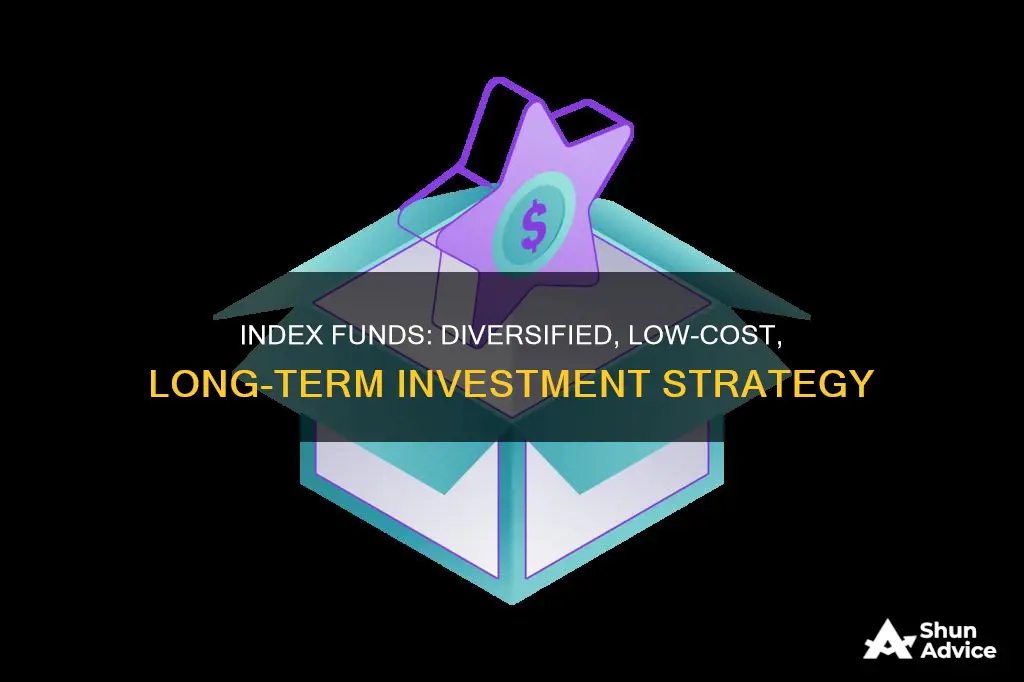
Index funds are a popular investment choice due to their potential for stable long-term returns, diversification, and low fees. They are a type of mutual or exchange-traded fund (ETF) that tracks the performance of a market index, such as the S&P 500, by holding a representative sample of the same stocks or bonds. Index funds are passively managed, meaning they aim to mirror the performance of their target index rather than actively trading to outperform the market. This passive approach results in lower management fees, typically ranging from 0.04% to 0.07%, compared to 1-2% for actively managed funds.
Index funds offer broad market exposure and diversification, reducing the risk of significant losses from the poor performance of a single stock. They are also convenient, as they provide instant access to a large collection of stocks, bonds, or other securities with a single investment. Additionally, index funds have lower turnover ratios, resulting in lower taxes on capital gains.
Despite these advantages, index funds have some drawbacks. They lack downside protection and flexibility, meaning they decline in value when the market does and cannot pivot to new investments when the market shifts. They also automatically include all securities in an index, including overvalued or weak companies.
Overall, index funds are a good option for investors seeking low-cost, diversified, and passive investments, particularly for long-term goals such as retirement.
| Characteristics | Values |
|---|---|
| Management fees | Lower than other funds due to passive management |
| Performance | Consistently outperform other types of funds in terms of total return |
| Risk | Low due to high diversification |
| Tax | Tax advantages due to lower turnover ratios |
| Cost | Low expense ratios |

Low fees
One of the most significant advantages of investing in an index fund is its low fees, which can translate to substantial savings for investors. Here's a more detailed look at why low fees are a significant advantage:
Low Management Fees
Index funds are passively managed, meaning they aim to replicate the performance of a specific market index without actively picking securities or timing the market. As a result, they have much lower management fees than actively managed funds. The expense ratios of index funds are typically lower because they don't require a team of analysts and portfolio managers to choose investments or time trades. The expense ratios of index funds usually range from 0.03% to 0.07%, and some even have ratios as low as 0%. In contrast, actively managed mutual funds often have expense ratios ranging from 1% to 2%. This difference in fees can significantly impact investors' returns over time.
Lower Transaction Costs
Index funds also benefit from lower transaction costs. Since index funds hold investments until the underlying index changes, which doesn't happen frequently, they incur lower trading fees. Actively managed funds, on the other hand, may trade more frequently, leading to higher transaction costs. These reduced costs can make a noticeable difference in investment returns, especially over the long term.
Tax Efficiency
The passive nature of index funds also contributes to their tax efficiency. Lower turnover rates in index funds result in fewer capital gains distributions, making them more tax-efficient than actively managed funds. Additionally, index funds tend to hold their investments for more extended periods, leading to a higher proportion of long-term capital gains, which are taxed at a lower rate than short-term gains. This further enhances the overall return for investors.
Long-Term Performance
While past performance doesn't guarantee future results, historical data shows that index funds have consistently outperformed actively managed funds over time, especially after accounting for fees and expenses. The low fees associated with index funds contribute significantly to this outperformance, as higher fees can eat into investment returns.
In summary, the low fees of index funds are a significant advantage for investors. The passive nature of index funds, combined with their low management fees, lower transaction costs, and tax efficiency, results in substantial cost savings for investors. These cost savings contribute to the overall returns of index funds, making them a compelling investment option.
Mutual Funds: Investing Basics and Strategies
You may want to see also

Low risk
Index funds are a great way to invest with a low-risk strategy. Here are some reasons why:
Broad Diversification
Index funds provide instant diversification, which minimises the risk of losing money. An index fund tracking the S&P 500, for example, would hold around 500 different stocks. While the performance of each stock fluctuates, having all of them in your portfolio means its performance matches the index. This ensures your portfolio's value is not overly dependent on the fortunes of any one company in the index.
Low Management Fees
Index funds are passively managed, meaning they simply track an index by buying and holding all the stocks within it. This means there's little work for the fund manager to do, so the expense ratio and management fees are low. Actively managed mutual funds often have expense ratios ranging from 1% to 2%, whereas index funds typically have ratios between 0.05% and 0.07%, and some are even lower or non-existent.
Lower Turnover Ratio
The turnover ratio is the percentage of a fund's holdings replaced in a year. Index funds have a lower turnover ratio than actively managed funds, usually about 1-2% per year compared to 20% or more for some active funds. This means lower transaction costs, which can make a big difference to your returns over time.
Lower Taxes on Capital Gains
Index funds' low turnover ratios also result in fewer capital gains taxes. Because fund managers aren't selling stocks frequently, there are fewer capital gains to pass on to shareholders.
Attractive Returns
Index funds often yield high returns for a low cost. Even the smartest and most diligent portfolio managers rarely steer actively managed funds to beat index funds. Research by Standard & Poor's found that only about 23% of actively managed mutual funds outperform the S&P 500 over five years.
Long-Term Performance
Index funds have consistently outperformed other types of funds over the long term. This is due to their low fees and broad diversification.
Reduced Volatility
Index funds' broad diversification also helps to reduce volatility. While individual stocks can fluctuate wildly, index funds are more stable because they're not dependent on the performance of a small number of companies.
Safety
While it's technically possible to lose everything in an index fund, it's highly unlikely. For this to happen, every stock in the index would have to go to zero.
In summary, index funds offer a low-risk investment strategy due to their broad diversification, low fees, reduced volatility, and strong long-term performance. They are a great choice for investors seeking a simple, low-cost way to invest in a wide range of stocks or bonds.
A Simple Guide to Investing in Fidelity's Low-Cost Index Funds
You may want to see also

Tax advantages
Index funds are considered to be tax-efficient for a number of reasons. Firstly, they generate less taxable income due to their passive nature. Actively managed funds buy and sell investments more frequently, resulting in a larger percentage of short-term capital gains, which are taxed at a higher rate than long-term capital gains. In contrast, index funds hold their investments for longer periods, resulting in more long-term capital gains and lower taxes for investors.
Index funds also have extremely low turnover ratios, meaning they buy and sell securities less frequently than actively managed funds. This results in fewer capital gains distributions, which trigger capital gains taxes. Additionally, the passive nature of index funds means they require fewer transactions, resulting in lower transaction fees and commissions, further reducing costs for investors.
The structure of index funds also contributes to their tax efficiency. For example, when accommodating investment inflows and outflows, index fund managers create or redeem "creation units", which are baskets of assets that approximate the fund's investment exposure. This process allows investors to avoid capital gains taxes on individual securities within the fund.
Furthermore, index funds that invest in growth stocks, such as the Vanguard Growth Index Fund Admiral Shares (VIGAX), are also considered tax-efficient. Growth stocks typically reinvest their profits to fuel growth rather than paying dividends, resulting in lower taxes for investors.
Jim Rogers' Commodity Fund: A Guide to Investing
You may want to see also

Instant diversification
Index funds are also more cost-effective than owning a large number of individual stocks, as they have lower expense ratios and taxes on capital gains. The expense ratios of index funds typically range between 0.05% and 0.07%, and some funds have no expense ratio at all. In contrast, the expense ratios of actively managed mutual funds often fall between 1% and 2%.
The low costs of index funds are due to their passive management strategy. They aim to replicate the performance of a specific index without actively picking securities or timing the market. As a result, they have lower management fees and transaction costs than actively managed funds.
Index funds also offer attractive returns over time. Despite fluctuations in the performance of individual stocks, the overall stock market tends to increase in value over time. Historical data shows that index funds have consistently outperformed actively managed funds, especially after accounting for fees and expenses.
In summary, index funds provide instant diversification, lowering risk and enhancing returns, while also offering a cost-effective way to invest in a wide range of companies and sectors.
Invest Like Founders Fund: Strategies for Success
You may want to see also

Attractive returns
Index funds are considered one of the smartest types of investments. One of the key benefits is that they provide attractive returns.
Index funds yield high returns for a low cost. They have consistently outperformed other types of funds that are actively managed by top investment firms. For example, in 2007, Warren Buffett made a $1 million bet that an S&P 500 index fund would beat the returns of an actively managed hedge fund over 10 years, and he won.
Index funds are passively managed, meaning they seek only to match the performance of a given index. They are not designed to beat the market, but to mirror it. This means they are not subject to the high costs of active management. Actively managed funds require an assortment of ongoing research and analysis, and the buying and selling of investments, which can be costly.
Index funds, on the other hand, have considerably lower costs. They have lower expense ratios, lower transaction costs, and lower taxes. Because they trade less frequently, they generate less taxable income that must be passed on to shareholders.
Over the long term, index funds have outperformed actively managed funds, especially after accounting for fees and expenses. This makes them an excellent value for any investor.
DFA Funds: Smart Investment, Diversified Returns
You may want to see also
Frequently asked questions
Index funds are a popular investment choice due to their potential for stable returns, diversification, and low fees. Here are some advantages:
- Broad Diversification: Index funds provide instant diversification by investing in a large collection of stocks, bonds, or other securities, reducing the risk of losing money.
- Low Costs: Index funds have lower management fees than actively managed funds since they are passively managed and don't require frequent trading.
- Attractive Returns: Historically, index funds have outperformed actively managed funds over time, providing attractive returns for investors.
- Tax Efficiency: Lower turnover rates in index funds result in fewer capital gains distributions, making them more tax-efficient.
- Convenience: Index funds are convenient as they contain a diverse range of stocks that would be challenging to replicate individually.
- Low Financial Knowledge Requirement: Index investing is relatively easy and does not require extensive financial knowledge compared to building your own portfolio.







